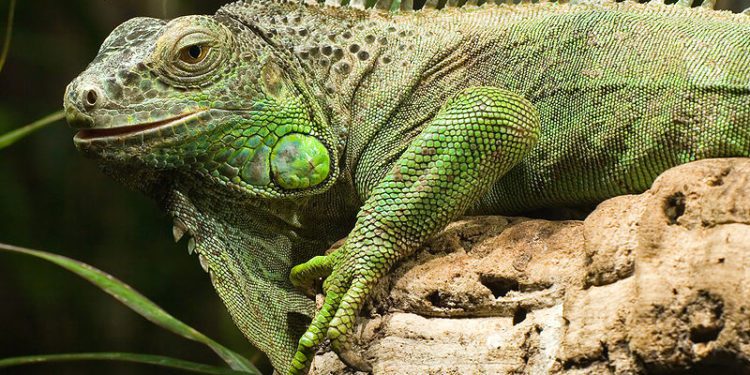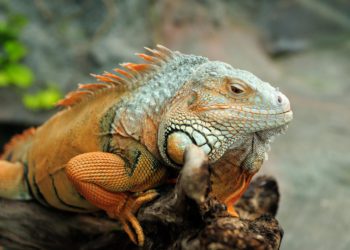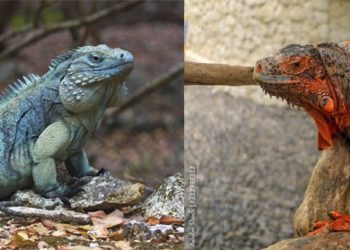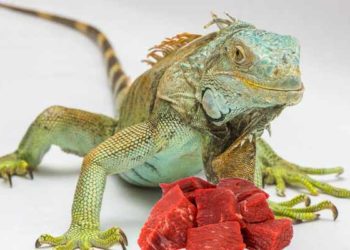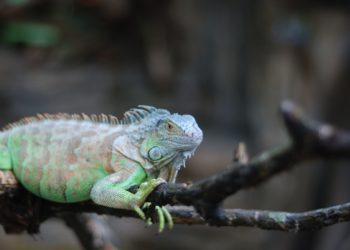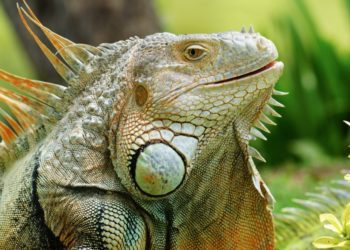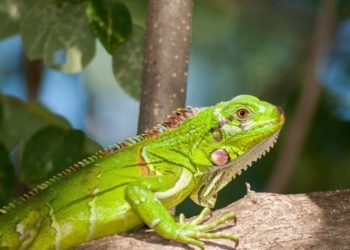Iguana is a smart reptile and an ideal one when you think of keeping it as a pet. Our pets are like our family members and we like to see them in good health. So when we see the health is deteriorating and the pet is not keeping well, this becomes a cause of concern for us. We must be aware of the reasons that are bothering the pet, as well as maintain the ideal body weight.
This large reptile grows with age, a baby iguana looks much slimmer, but it will gain weight with time. So you have bought one juvenile iguana at home, do not try to feed it too much because it looks lanky. It will be healthier as it will grow.
Iguanas can become depressed, and lose weights. Or they can undergo certain illness which is causing them to lose weights. So now we shall be discussing how and when you may find your iguana going skinny.
Contents
Sign of weight loss in Iguana
If you find these below symptoms in your iguana, then you need to be alert that it is losing weight at an alarming rate.
The limbs will be thin and those will seem to look loose. They will be hanging from the body of the iguana.
The spine part will be protruding out of the body which is another sign that the body is losing all the fat. The plumpness will be missing which means it is losing weight.
If you have a kitchen scale then use it to monitor the weight of your pet iguana. You should take the weight once a week. But when you see rapid weight loss it is better to check once in two days, to understand the severity of the problem.
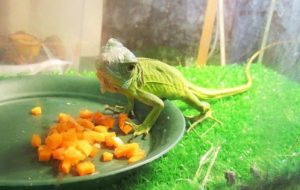
Cause of weight loss in Iguana
Depression or anxiety:
Iguanas can get anxious or depressed really fast. Some new pet in your house or in the vicinity or some sudden shock due to some change in the atmosphere is enough to make them stressed. Whenever they are stressed, they can eat less as hunger decreases.
Becoming gravid:
A matured female iguana can get skinnier on the limbs, but the torso remains in fluffy shape. If you see this condition then it may be the result of becoming gravid. This is also the cause of losing appetite at this time.
At the end of the pregnancy period, a female iguana stops eating or eats very less. The belly will look swollen and the iguana will be moving restlessly within the enclosure, also you can see it digging on the substrate. The tails and limbs will become visibly thinner and it will become uninterested in food.
Feeling unwell:
If for any reason the iguana is not feeling well, then it will not eat properly. This may lead to weight loss and getting thin. You can try different kinds of vegetables, fruits or other items. But if there is no sign of hunger in the pet, you should go and see a veterinarian.
Different kinds of the sickness of Iguana:
Indigestion:
Your iguana can get affected by digestion problem, which are the issues with pancreas, stomach or liver. Check its food and make sure you are offering it healthy and fresh vegetables. Often it is caused due to some fruits which are not always helpful in the digestion system.
Also, the iguana can have a gas that has filled its stomach. Liver issues and improper diet can lead to a gas problem, and when the stomach is filled with gas, the creature will not be able to eat properly as it will feel less hungry. This can be a reason for its weight loss.
Dehydration:
This is another cause of the iguana getting lighter and thinner. If your pet is not having enough water, then it can suffer from dehydration. But you need to be sure before treating it, as getting thin does not always mean it is not having ample water. Also if you think that it is not having the adequate amount of water then you need to get it checked by the veterinarian.
There are certain symptoms which will make you understand that your iguana is suffering from dehydration. Sunken eyes, fast weight loss, sticky saliva, looseness in the abdomen are some such symptoms which can be caused by dehydration.
If you ignore the dehydrated situation of your iguana, it may lead to serious ailment and can be fatal for the pet. So you should start misting your iguana as well as giving it bath on every alternate day. Also, you can give it fruits and vegetables with high water content to regain the amount of moisture in its system.
Infection by parasites:
If there are parasitic infections on your iguana, it will result in losing appetite and thus losing energy and weight.
You can keep a check on the stool of your pet, which can have small but visible parasites. Though there is some kind of parasites which are invisible in excrete like pinworm, hookworm or protozoa. You need to get the poop checked by the vet to know what is wrong with the pet’s health.
Impaction:
This is one of the severe causes of weight loss. While getting impacted by eating substrate or other materials is common among iguana, it will result in less eating. But the problem is you will not be able to understand this problem at the beginning.
An impacted iguana will eat normally at first, but will eat less and less in coming days. Using loose substrate on the enclosure of your iguana will initiate the problem of impaction. Not only that, any other loose objects like paper pieces or loose hair strands can be swallowed by the iguana while it is roaming in the yards.
This situation is usually not noticed until it gets serious, so you need to keep an eye on the weight of your pet iguana to know when it is losing or gaining weight, to understand any abnormality.
Diabetes:
This is a kind of situation when your iguana is having a normal diet and defecating properly, yet is losing weight. This can be a symptom of diabetes which is a common disease among iguana.
If you see that it is having more water than usual then go to a vet to get the iguana checked for diabetes. Weight loss as well as drinking too much water is sure signs of diabetes.
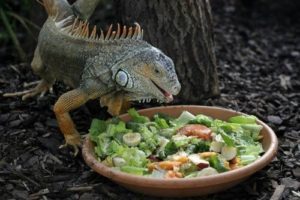
How to Help Your Iguana Gain Weight?
If you give your pet properly balanced food then it will gain an adequate amount of weight with age. A nutritious diet is a must when you wish to keep any pet. You should know which foods are good for it and arrange them in the diet.
The diet should not be monotonous, so you need to be a little bit creative and offer it some good vegetables and other things mixed on the platter. The dish should have all the essential ingredients that are needed for good health.
Feeding vegetables that are dark green in colour and high in calcium is recommended. Calcium is an important mineral for the iguana, as they get weak by the bone soon if the calcium intake is not regular. So to boost their bone structure you must feed some calcium-rich fruits and vegetables.
Good amount of lighting and heat:
Not only food, an adequate amount of temperature, humidity and light is also needed to keep the iguana healthy and gain proper weight. Fitting a good quality UVB/UVA light is recommended for the enclosure of the iguana.
Also if you can get it some natural sunlight, it will be of much help. You can do that by letting it roam on the farm or at the backyard. The UV rays present in the sunlight will naturally lift its mood and will make it hungry. So it will be able to digest more food and get in good shape.
Importance of temperature for iguana:
The temperature of the enclosure should be not less than 87 degrees Fahrenheit. The basking area can be hot up to 95 degrees. Iguanas are native creatures from a hot and humid area so it is good for them to stay in high temperatures.
Heat works on the food digestion of iguana. When the heat emitter in the enclosure of your iguana is not working properly, it may result in indigestion. Thus the iguana will not be able to digest its meals and will also eat less. This is another cause of its weight loss.
When you take your iguana out for a walk or let it be on the basking area, keep the temperature stable for at least 15 minutes. This is the minimum time that is required by the iguana to soak in.
Best food for Iguana
There are various vegetables and leaves which are helpful for iguana. These are all nutritious and thus will help your pet to gain weight if fed regularly. Collard greens, turnip greens, mustard greens, alfalfa hay, parsley, romaine and kohlrabi are some of the greens that have ample amount of calcium and other minerals.
Broccoli, cactus, squash, bell peppers, sweet potato, green beans, sprouts, mushroom, asparagus, okra, peas, parsnips and corn can also be included in the diet of the iguana. However, the greens should make up to 60% of their diet while the vegetable can be 20% of the diet to make it balanced.
Fruits are to be fed occasionally as these often contain acids which are not good for iguana. Along with that, there are natural sugars in form of fructose and sucrose, which can increase the level of sugar in the blood of iguana. As they are not used to eat fruits in their natural wild habitat, the minerals contained in fruits will be harmful to them and may cause diabetes or obesity.
Some vegetables too, like cabbage, kale, mustard green contain goitrogens, should be fed in a small portion. Otherwise, the problem like goitre will affect the iguana.
You can offer it vegetables cut into small pieces and can give them raw. Some vegetables can be boiled before offering to iguana, but it is preferred not to give them cooked food much. While cooking, the essential nutrients are removed from the vegetables which are not good for your pet reptile.
Which fruits can be fed to iguana?
You can feed iguana banana with skins, along with pear, apple, mango, grape, peaches, tomato, guava, kiwi, apricot, fig, blueberry, melon etc. these fruits are poor in nutrient but high in water content. So you can feed these fruits when the iguana is getting dehydrated.
Feeding fruits should not exceed 10% of the diet. But iguanas love to eat fruits so you can give it as treat to them.
Which flowers can they eat?
There are certain flowers which are edible to iguana, like hibiscus, geranium, carnation, roses, nasturtiums etc. Iguanas will love to eat these flowers with the vegetable salad in their diet.
Which seeds can iguana eat?
Some beans and seeds can also be fed to iguana to increase their weight. Boiled lentils, pinto beans, kidney beans and navy beans can be fed to them.
How many times in a day iguana eats?
A mature iguana eats two times a day, and the main meal is taken in the morning. Later in the day, it can take another light meal.
Baby iguanas can eat thrice a day, comprising of two main meals and another snack. Mostly they love to eat vegetables and flowers, with some occasional pieces of fruits.
Conclusion:
Do not hope to see immediate changes in the weight of your pet iguana. It will gain weight if you are following all the guidelines meticulously. Sudden and random weight gain is not a healthy sign so wait patiently to see the change in its body. Also do not only go for the look. If your iguana is weighing alright and still looks a bit thin, do not panic. It should have a strong bone structure and should be healthy inside. If the frame of the iguana’s body is strong and it is seen energetic, then there is nothing to be worried.
More:


